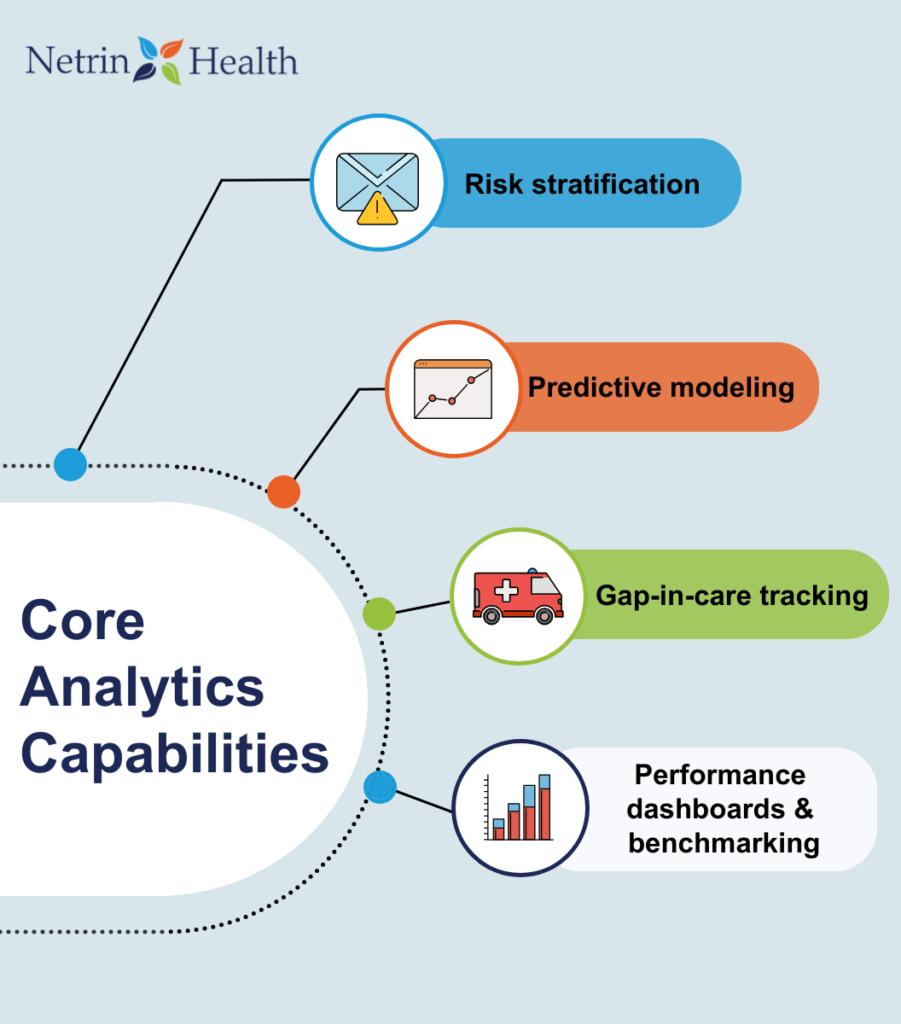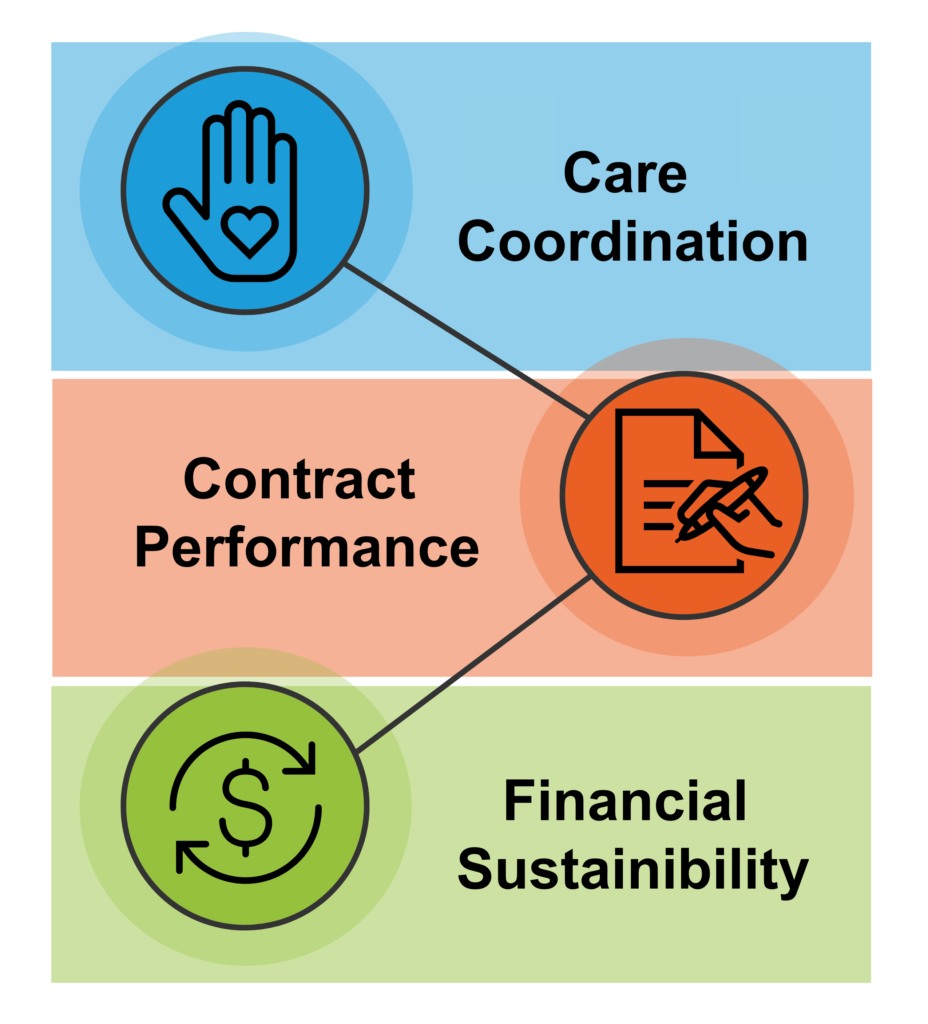Share Article
The difference between an ACO’s success in shared savings and one that struggles often comes down to a single factor: how effectively it uses its data. With costs rising and influx of data reports flowing in, ACOs will not stand alone from their fragmented EHR reports. ACOs need population health analytics that bring insights from claims, clinical data, and patient demographics. When done effectively, analytics not only drive better outcomes, but ensure that every performance metric, from quality scores to risk adjustment, directly supports the ACO’s financial sustainability.
Value-Based Care and the Role of ACOs
As defined by the Centers for Medicare and Medicaid Services (CMS), value-based care shifts the focus from volume to value, designing care that focuses on the quality of care, provider performance, and patient experience. Unlike fee-for-service models: value-based care puts emphasis on whole-person care, where teams of healthcare professionals collaborate on improving a patient’s physical, social, mental, and behavioral health.
Accountable Care Organizations (ACOs) put this vision into action. ACOs are groups of doctors, hospitals, and other health care professionals that work together to give patients high-quality, coordinated service and health care, while reducing unnecessary costs. But success doesn’t come easy. ACOs must manage vast amounts of patient data to achieve shared savings, meet their performance metrics, and sustain financial performance.
The application of advanced data analytics in health informatics has already demonstrated enormous benefit across healthcare domains such as precision medicine, clinical decision support, patient monitoring, readmissions prevention, and population health management.
Healthcare Information and Management Systems Society (HIMMS)
That’s where population health analytics becomes essential. By unifying fragmented data and turning it into actionable insights, ACOs are able to improve health outcomes, close gaps in care, and identify risk to meet their organizational success. In today’s world of value-based care, analytics isn’t just a tool but is a backbone to an ACO’s success.
Why Analytics Matter
As the healthcare industry transitions to value-based care, predictive analytics in healthcare has become impossible to ignore. Rising costs, limited internal resources, and increasing patient complexities have required ACOs to do more than just track data. They need insights that can directly guide to smarter decision making and unified decision support. This is where value-based care analytics deliver results.
Performance Compass
Analytics serve as a performance compass. These analytical tools help guide healthcare organizations to see how well they are at cost containment. By gaining information such as ACO’s unnecessary ED utilization, this data allows for opportunities to redesign workflows, improve efficiency, and reallocate resources. Just as importantly, ACO analytics highlight their performance on their quality metrics within their Medicare Shared Savings Program (MSSP). Because shared savings are tied to cutting healthcare expenditures and hitting benchmark quality metrics, the ability to monitor and act on the data in real time can make or break an organization’s financial outcomes.
Population health big data will drive insights that allow physicians to better track the social needs most pressing for their patients, aggregate patient-level data to form a coherent strategy formed by social determinants, and help emphasize areas where productive partnerships can be built within the broader health care community.
Journal of General Internal Medicine
Patient Engagement
Analytics also highlight patient engagement, which is associated with success in value-based care and ACO performance. By tracking data such as appointment adherence, medication fills, and interactions with care managers, this helps ACO’s improve patient satisfaction, while also allowing the patient to be a part of their healthcare journey. These insights deliver effective approaches for outreach strategies, like enrolling patients on remote patient monitoring programs and finding the best way to get the highest engagement out of them.
Identification of High-Risk Patients
Analytics can also help ACOs identify their high-risk patients, using date trends in their chronic diseases, ED utilization, and social determinants of health. These risk stratification strategies in healthcare help to identify how to best allocate an ACO’s resources to the patients who may be costing the most.
In day-to-day operations, these analytics are tangible and effective. Providing more than just numbers, these tools help create a roadmap for clinical and financial success. For ACOs, population health analytics are crucial to the organizational success of making their shared savings and improving the health communities in their network.
Core Analytics Capabilities
For Accountable Care Organizations to succeed in value-based care, strong analytics capabilities are essential. Four core analytical capabilities stand out as foundational success for ACOs. Together, these elements form the bridge between data and measurable outcomes.

Risk stratification: ACOs serve a wide array of patient populations, with ranges of health status. Risk stratification helps ACOs to categorize patients as high-risk patients, thus allowing care teams to allocate resources more effectively and concentrate on outreach and interventions. This makes ACOs proactive in keeping healthcare costs low, along with individuals suffering from chronic diseases receiving the care they need, ultimately leading to improved outcomes.
Predictive modeling: Predictive modeling helps keep ACOs to be ahead of their goals. Predictive modeling, using historical data, forecasts future events such as hospital readmissions, disease progression, or escalating healthcare costs. This allows for proactive intervention to test places where improvement can be made, to obtain shared savings as an organization. These tools need to be monitored and adjusted to ensure that strategies are aligned with both patient needs and regulatory requirements.
Gap-in-care tracking: Gaps in care must be addressed to improve quality and financial performance. Analytics platforms can detect when patients do not receive essential preventive screenings, fall behind on medication & remote patient monitoring scans, and follow-up visit attendance. These analytics empower providers to move quickly, ensuring patients are receiving the correct care in a timely manner. In addition to improving the health outcomes, gap-in-care monitoring helps ACOs meet the CMS quality benchmarks to maximize their shared savings goals.
Performance dashboards & benchmarking: Dashboards help summarize and present data into easy-to-interpret views. Performance dashboards compile clinical, operational, and financial metrics to help ACOs keep current visibility of their performance. Using benchmarking, ACOs can use the consolidated results to compare themselves with national averages to gauge areas of improvement.
Impact of Population Health Analytics on ACO Operations
Population health analytics are crucial to running a successful ACO business. By converting fragmented data into meaningful insights, analytics empowers care teams, improves contract performance, and improves an ACO’s financial well-being.

Care Coordination
Defining patient populations with one or more complex chronic diseases is one of the largest challenges facing ACOs. Predictive analytics can identify high-risk patients and coordinate care manager outreach. This serves to keep the resources focused where they are needed, avoiding unnecessary hospitalization, and limiting use of emergency departments for non-urgent care. These analytics can further produce individualized care management plans by integrating remote patient monitoring program data with real-time feedback on the progression of a patient. With this kind of insight, care teams act ahead of time before issues escalate, resulting in a more streamlined care process for patients.
Contract Performance
ACOs are held accountable for quality and cost under contracts such as the Medicare Shared Savings Program (MSSP) and commercial value-based agreements. Success in an ACO depends on hitting performance benchmarks while closing care gaps. Big healthcare data allows organizations to see where they are excelling and where they are falling behind, particularly in meeting CMS quality measures. By tracking utilization trends, care delivery patterns, and spending, analytics helps ACOs identify improvement areas that directly influence shared savings and contract compliance.
Financial Sustainability
Lastly, financial sustainability is imperative to last in the ACO industry. Analytics provides leaders with tools to measure organizational health, pinpoint problems, and adjust workflows accordingly. Unified platforms that bring together clinical, operational, and financial data allow for a clear view of performance. This not only supports day-to-day management but also helps guide strategic planning. By using data to inform decision-making, ACOs can adapt more quickly to industry changes and maintain financial sustainability in a challenging healthcare landscape.
Practical Tips to Maximize Analytics in Accountable Care Organizations
To get the most value from population health analytics, ACOs should focus on these core practices:
Integrating data across systems
- Combine EHRs, claims, and social determinants of health (SDOH) into a single platform
- A unified view supports risk stratification, gap-in-care tracking, and performance monitoring like we mentioned above
Prioritize change management
- Clearly communicate the value of analytics to staff and clinicians
- Provide training and apply those insights to workflow processes
- Make analytics simple to use so teams can adopt naturally
Build a data-driven culture
- Encourage transparency and accountability when it comes to data
- Celebrate wins where analytics improve outcomes or reduce costs
- Use data to guide everyday decisions across clinical, financial, and operational teams
With the right integration, change management strategies, and culture, analytics shifts from being a tool to becoming the foundation of ACO success.
Future Outlook
As healthcare shifts to value-based care, population health analytics are essential for ACOs to thrive. Netrin Health empowers organizations to turn data into action, strengthening shared savings strategies and driving lasting success. Contact us to discover how Netrin can help your ACO succeed.
